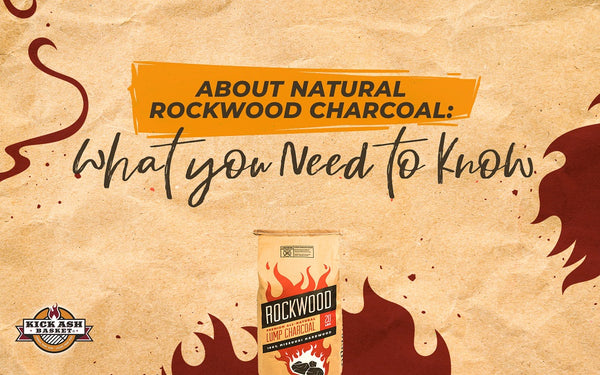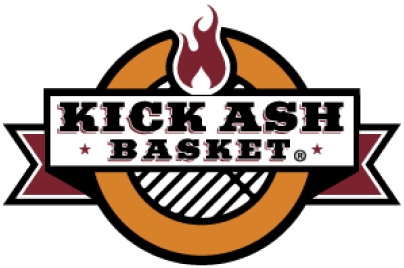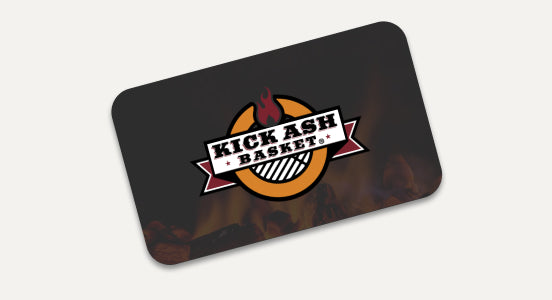
About Natural Rockwood Charcoal: What You Need to Know
Your source of fuel is just as important to the grilling process as your choice of meat and spices. It will affect the flavor and help you maintain an ideal environment to cook your food perfectly. There are tons of choices out there for grill fuel; so, where should you start?
In this post, we’ll cover the differences in charcoal and briquettes that you can expect to encounter when grilling. Then we’ll look at whether or not natural rockwood charcoal is the right fit for your grill.
No matter what kind of charcoal you ultimately decide to grill with, you’ll need a quality Kick Ash Basket to maintain a great bed of coals. Kick Ash Baskets make it really easy to shake off the ash from previous grilling sections without losing the coal that still has some burning left to do. Using these game-changing baskets allows you to maximize your natural rockwood charcoal while also making it easy to switch out coals between grilling sessions.
Limited Time Giveaway
Want free Rockwood Charcoal and Kick Ash gear? Check out the special contest where you could win a Basket & Can of Choice, Grill Towel, Hat, & Rockwood Charcoal.

Photo by Andrey Andreyev on Unsplash
Difference Between Charcoal and Briquettes
There are two main fuel sources for experienced grill masters: briquettes and lump charcoal. Briquettes are generally cheaper, and are made from a combination of additives, wood, and sawdust. Briquettes burn for a longer period of time, but don’t burn as hot as charcoal. However, charcoal burns faster and hotter than briquettes and are more expensive.
As the pros will tell you, if you’re more patient and aren’t worried about spending too much money on grilling, charcoal is going to be your best option. Charcoal is all natural, can get your grill up to hotter temperatures, and doesn’t have as many weird chemicals in it. Briquettes are ideal for people who are grilling on a budget! There are also biomass briquettes which can be less wasteful and better for the environment.
Additionally, charcoal usually has less or no additives, which means that you can easily use the ashes as fertilizer. You won’t be able to take regular briquettes and dump them in your garden. Disposing of coals and grilling byproducts can be annoying at best and wasteful for the environment at worst—using charcoal is a good way to get around that.
Rockwood Charcoal
Rockwood charcoal takes this distinction between briquettes and charcoal seriously. They produce environmentally responsible charcoal, and even have bags and ashes that can be composted!
They use trees responsibly, buying the timber that is leftover from different forest operations, like milling. They don’t use scraps from softwoods or pieces that might contain resin, allowing for a cleaner burn. Once the hardwood makes it to the Missouri plant, it’s processed in high temperatures which burns out the smoke that would linger at lower temperatures. The plant is low emission because of the high temperatures which it uses.
As the charcoal is processed, there are smaller pieces that fall through the grating. Because the charcoal is all natural and even the ashes can be reused as fertilizer, the charcoal chunks that fall through the grating can be sold as agricultural soil. Charcoal products are usually infamously hard to get rid of.
Even the packaging is natural! The paper bag is made from wood pulp which can be burned without creating harmful fumes so the bag works as paper for your favorite chimney starter.
Click Here To Enter Our Giveaway with Rockwood Charcoal
Grilling with Rockwood Lump Charcoal
Of course, rockwood lump charcoal isn’t just good for the environment. It’s really good for your grill and your meat as well. Rockwood lump charcoal burns clean, and doesn’t rely on chemicals to produce the consistent grilling heat that you need. Unlike briquettes, lump charcoal produces a lot less ash. The ash from the briquettes can actually clog up a smoker during a cook that goes for a long period of time. If you’re cooking long and slow, an investment in a quality lump charcoal like Rockwood is going to be ideal.
Lump charcoal burns even hotter than briquettes so it’s also better for hot and fast cooking. Lump consists of pure charcoal and pure carbon, so you get a really consistent fire during the entire grilling session.
Hardwood and Softwood Lump Charcoal
Softwood lump charcoal can be affordable, but it contains a lot more sap and is not nearly as dense as the hardwood variety. This means that you will see a lot more smoke in your grill, it will be tougher to maintain higher temperatures and the charcoal itself won’t last nearly as long. Great lump charcoal is made from hardwood.
Additionally, rockwood lump charcoal is quality because it is kilned at much higher temperatures than some other kinds of lump charcoal. If you lump charcoal correctly, it should shatter into a few different pieces when you throw it at a hard surface. Proper kilning means that all the wood, sap, and nasty tar in it has been removed through the burning process. Charcoal that is not kilned thoroughly or at a high enough temperature is still going to have wood in the middle of it.
What Happens if My Charcoal Still Has Wood in the Middle?
Cooking with charcoal that still has wood in the middle is a difficult process. It will be tough to keep the temperature of the grill below or around 250 degrees because the wood in the middle of the charcoal will catch fire and raise the temperature. It will also be hard to exceed 500 degrees—if you’re having trouble maintaining a grilling environment on either end of the temperature spectrum, you’re buying bad charcoal.
Low quality charcoal makes it really difficult to hold the grill at a consistent temperature, which in turn makes it really tough to evenly cook your meat on a charcoal grill.

Photo by Almos Bechtold on Unsplash
What’s Different About Rockwood Lump Charcoal?
Rockwood lump charcoal comes only from hardwood in Missouri. This control over the supply line means that they are able to produce remarkable consistency in all of their products. That consistency in product translates to consistency in your grilling—even charcoal burns more smoothly throughout, which standardizes your grilling process.
How Long will Rockwood Lump Charcoal Burn?
Since rockwood lump charcoal is high-quality hardwood charcoal, you’ll find these coals on the far end of the long-lasting spectrum for fuel sources. As with any kind of fuel for your grill, the total length of burn will depend on how much air is available for the coals to eat up. If you open up the vents or leave the lid off, you’ll quickly find that your coal burns through itself super quickly. On the other hand, if you control the insulation and air flow, like on a Kamado smoker, you’ll be able to get a full day of grilling with a single load of charcoal.
Different grill types will give you different amounts of air flow. There might not be a perfect charcoal grill, but there certainly is a charcoal grill that’s perfect for you.
You can shop for grill accessories based on the grill type, making it easy to get all the dividers, baskets, and ash cans you need for easy grilling.
Rockwood Lump Charcoal and Grill Cleaning
Cleaning a grill shouldn’t be hard as long as you’ve cooked properly and haven’t burned or smoked anything into oblivion on the top. Rockwood lump charcoal should help you clean properly, because it burns cleanly and produces a minimal amount of smoke. Using briquettes or fuel sources which are less clean can result in nasty residues and resins which are really tough to get off the grill.
Want Some Free Charcoal?
Want free Rockwood Charcoal and Kick Ash gear? Check out the special contest where you could win a Basket & Can of Choice, Grill Towel, Hat, & Rockwood Charcoal.

